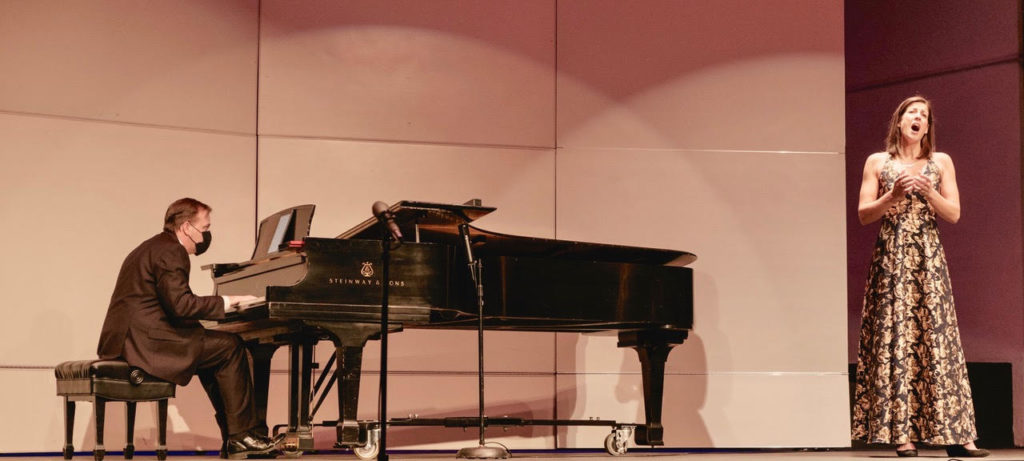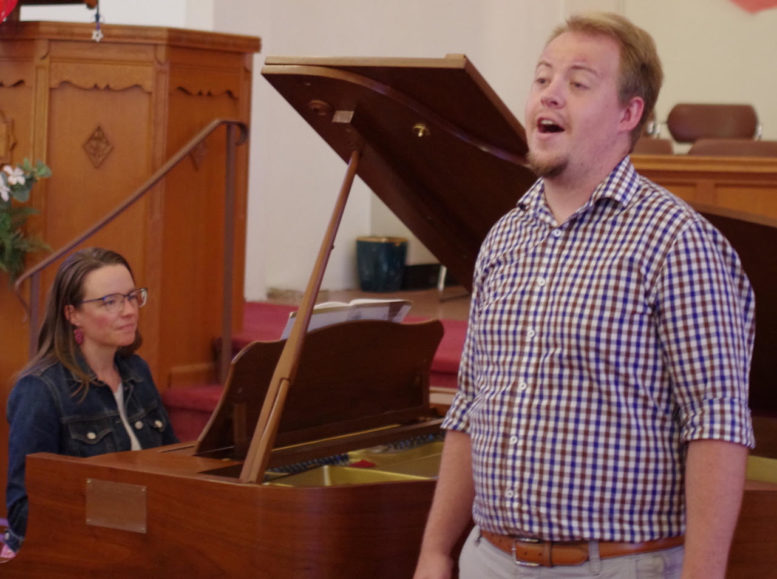By DAVID DUPONT
BG Independent News
When a quartet musicians assemble to perform a concert at First Presbyterian Church in Bowling Green they will be doing more than presenting a set of songs – they will sharing parts of their lives.
The concert was organized by Heather McEwen Goldman who has taken over as music director at the church she grew up in.
Already the church’s organist, now she’ll conduct the choirs she was a member of, and bring together a bell choir, which she had played in growing up.
An Evening of Song will be presented Thursday July 7 at 6 p.m. in the sanctuary of the First Presbyterian Church, 126 S. Church St., Bowling Green. It will feature vocalists Caroline O’Dwyer and Aaron Roos performing with McEwen Goldman on piano. Her husband Ted Goldman, composer, will provide musical commentary.
She was inspired to stage the concert by her appreciation of the talents of Roos, who preceded her as the church’s music director, and the desire to perform again with mezzo-soprano O’Dwyer, a friend and colleague from Eastman School of Music. The concert is free; donations are welcomed.

McEwen Goldman, who grew up in Bowling Green and started college as piano performance major at BGSU, and her husband moved to Bowling Green from New York City during the pandemic. It seemed safer, certainly less expensive.
Goldman is a Juilliard-trained composer who also works remotely doing computer programming work for his father’s New York City forensic accounting firm.
Now they and their two young children have settled in and made Bowling Green their home. When the organist position opened up at First Presbyterian, she applied, though she’d not played organ. McEwen Goldman said she had wanted to play organ since she was a child. She got the job based on her piano talents, and her promise to learn, so she took lessons with Michael Gartz, who teaches at BGSU and performs at area churches.
“I got my feet under me,” she said. “So I’m an organist, but not an expert organist.”
O’Dwyer and McEwen Goldman worked together when both were graduate students at Eastman School of Music in Rochester, N.Y. McEwen Goldman was studying collaborative piano and O’Dwyer was a voice performance student.
They were assigned to work together throughout their two year programs, performing and attending each other’s lessons. “It’s a really special experience because you end up growing and developing together not only as musicians and artists, but as in our case, becoming the closest of friends,” O’Dwyer noted in an email.
They have been in touch since their graduation in 2015, but have not performed together.
O’Dwyer said it was an honor to be invited back to sing in McEwen Goldman’s hometown.
The pandemic threw her for a loop. “When everything first shut down back in March 2020, it felt really difficult for me to sing,” she wrote in an email message. “I couldn’t teach my voice students in person, performances were canceled, and it seemed like the arts were being forgotten in the early days of the pandemic assistance programs. I think I didn’t really sing for almost a month when we first shut down.”
Then a friend Nathan Salazar shared a video of himself playing and singing one of the pieces from Carlos Guastavino’s set of Spanish songs “Cuando Acaba de Llover: Cuatro Canciones Coloniales.”
“It just brought me to tears, it was so, so beautiful. I wasn’t familiar with the composer, so I found the score and just fell in love with the whole set,” she wrote.
O’Dwyer programmed the set on her first recital after the shutdown in December 2021. She will share them with listeners in Bowling Green as well.
She’ll also perform Libby Larsen’s song cycle “Love After 1950.”
She wrote that she loves “the themes and the strong voices of the women that emerge out of the poetry that Larsen selected for this song cycle. They are at once contemplative, nostalgic, but also hilarious!”
The songs are also difficult. Larsen composes piano parts and vocal lines that are independent of each other giving the singer little mooring in terms of rhythm or pitch. “Once I started getting the vocal lines into my muscle memory they really did seem to fit my voice – despite how complex they look on the page, they just felt easy and natural for me to sing. In the world of contemporary art music, that situation is a true gift!”
Roos is choir director at Anthony Wayne, and has recently taken on duties in theater.
He’ll be performing both arrangements of folk songs and show tunes.
The folk tunes include “Shenandoah,” a favorite of his high school choral director, and the hymn “This Is My Father’s World,” dedicated to his father, who will be celebrating his birthday by attending the concert.
He’s also including “Ten Thousand Miles Away” by Steven Mark Kohn, music that first sparked his interest singing classical music.
Among the showtunes will be “Corner of the Sky” from “Pippin,” the Stephen Schwartz musical about a young man struggling to find a place in the world.
“When I found ‘Pippin,’ listening all the way through for the first time, I was having my own existential crisis,” he said.
He was attending Ohio State studying to be a sports broadcaster. “I was going to be the next Joe Buck.” But he discovered that as much as he loved sports, “that’s not wanted to live, breathe and sleep.”
So he left the program, studied at Cleveland State for a year, before coming to BGSU as a music education major.
He’ll also sing “You’ll Be Back” from Hamilton – “he absolutely inhabits it; he is King George,” McEwen Goldman said – and Bree Lowdermilk’s “Run Away with Me” from “The Unauthorized Autobiography of Samantha Brown,” which is one of his go-to pieces.
He’s never seen the musical, nor does he want to.
“We all have these pieces in our lives that we come across without knowing anything about them,” he said. “We attach meaning to them.”
But sometimes that’s contradicted when seen in the context of the full show. “So I don’t want to see the full musical because I like what the piece means to me now.”

